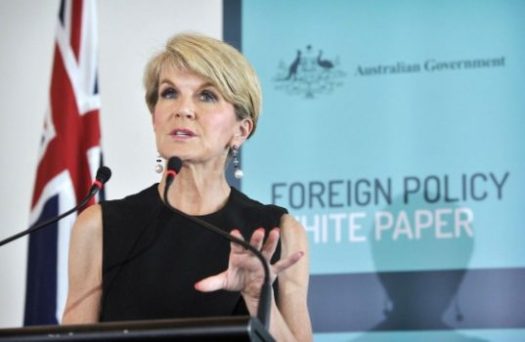The Foreign Policy White Paper: An Innovative Regional Big Picture?

Denis Bright invites comments on the recently released Foreign Policy White Paper which charts Australia’s short-term future in the Indo-Pacific Region to 2030. Is the White Paper essentially a federal LNP take on our future or can it accommodate some sparks of Australian independence?
The Guardian noted the sparks of critical independence from the Hon Julie Bishop as she anticipated the ascendency of Donald Trump just prior to the US elections in November 2016:
“Australia’s foreign affairs minister, Julie Bishop, has raised concerns about the unclear direction of US foreign policy if Donald Trump becomes president.
She said the federal government had considered what a Clinton administration would mean for Australia and it knew what to expect.
But if Donald Trump won the US presidency she indicated the government would have to work hard to ensure Australia’s interests were still looked after”.
Restating Conventional Priorities
The White Paper places Australia at the centre of an Indo Pacific Hemisphere. Our potential influence is increased by the White Paper’s attempts to integrate economic and strategic interests.
The US Global Alliance has evolved to integrate such objectives.
In its conventional support for contemporary market capitalism, the White Paper has signed up to a now outdated model of financialization which has caused so many social tensions both within Australia and in neighbouring countries like PNG, Indonesia and the Philippines.
In all locations, the emphasis on achieving high rates of economic growth have not translated into improved living standards. In Australia, falling real wages confront rising costs of housing, rents and social pressures to consume more.
GDP trends also show some weakening of Australia’s global economic strength.
Comparing GDP Trends 2016-2030

The White Paper is committed to the maintenance of Australia’s links with networks of friendly market economies. The high levels of US corporate investment in Australia are deemed to be a welcome sign.
By 2030, the US may have exhausted much of its current capacity for investment outreach. If the European Union is considered collectively in the GDP tallies, the US may be approaching the secondary status of the world’s fourth largest economy in PPP terms.
Origins of Direct Foreign Investment 2016

Looking further ahead to 2050, the US economy will be 58 per cent the size of the Chinese economy. In global rank, Australia may have moved from 19th to 28th (PWC Online 2017).
Are these trends a prescription for a better future or a return to colonial status within the US Global Alliance?
Has Australia’s Colonial Status been Revived in the White Paper?
Earlier generations of Australian leaders also wanted to live in the shadows of great and powerful friends in the British Foreign Office and the best wisdom from the Chancellor of the Exchequer.
 The Lyons Government (1932-39) was proactive on the world scene with Australian overtures to Germany through conservative rapport with Mussolini and Japan through more open trading contacts (image of Prime Minister Lyons in Campaign Mode: State Library of NSW).
The Lyons Government (1932-39) was proactive on the world scene with Australian overtures to Germany through conservative rapport with Mussolini and Japan through more open trading contacts (image of Prime Minister Lyons in Campaign Mode: State Library of NSW).
Today’s White Paper continues these traditions. Greater engagement with China and the wider Indo Pacific Region is influenced by the need for the maintenance of over-riding ties with the US Global Alliance.
Some of the caveats in the White Paper against a more independent engagement with the Indo Pacific Region are ideologically based. These articles of faith are deeply entrenched in Australian domestic politics by generations of mainstream Cold War rhetoric.
“It is strongly in Australia’s interests, therefore, to support US global leadership, including by maintaining the strength of our alliance, keeping our commitment to increase defence expenditure to two per cent of GDP and contributing to coalition operations in support of global and regional security.
Beyond the United States, our cooperation with like-minded partners is also increasingly important to collective efforts to limit the exercise of coercive power and support an open global economy and a rules-based international order.
Australia will support reforms that give new and emerging powers a greater role in the international system. Some change to institutions and patterns of global cooperation is inevitable, necessary and appropriate to reflect the greater weight of countries such as China, Indonesia, India, Nigeria and Brazil.
Reform should be a shared project. Australia is a willing partner. At the same time, Australia’s national interests are best advanced by an evolution of the international system that is anchored in international law, support for the rights and freedoms in United Nations declarations, and the principles of good governance, transparency and accountability”.
More youthful national leaders from New Zealand and Canada seem more able to challenge these ideological constraints.
Long-term commitments to Australian sovereignty and peaceful engagement with the Indo Pacific Region should always uppermost along the short road ahead to 2030. It will take a lot of progressive activism to modify the dogmatic scenarios in the current White Paper. It is likely to receive bipartisan support prior to the next federal election.
Pragmatic modifications can be made later during a more moderate phases of US domestic politics so that the emphasis in domestic political debate can be placed on more contestable issues like the protection of living standards and environmental sustainability. This at least challenges the bland commitments in the White Paper to neoliberal solutions first and foremost at home and abroad.
 Denis Bright (pictured) is a registered teacher and a member of the Media, Entertainment and Arts Alliance (MEAA). Denis has recent postgraduate qualifications in journalism, public policy and international relations. He is interested in promoting discussion to advance pragmatic public policies that are compatible with contemporary globalization.
Denis Bright (pictured) is a registered teacher and a member of the Media, Entertainment and Arts Alliance (MEAA). Denis has recent postgraduate qualifications in journalism, public policy and international relations. He is interested in promoting discussion to advance pragmatic public policies that are compatible with contemporary globalization.
Like what we do at The AIMN?
You’ll like it even more knowing that your donation will help us to keep up the good fight.
Chuck in a few bucks and see just how far it goes!
Your contribution to help with the running costs of this site will be gratefully accepted.
You can donate through PayPal or credit card via the button below, or donate via bank transfer: BSB: 062500; A/c no: 10495969










13 comments
Login here Register here-
John Richardson -
Stella -
Lalnama -
Mia -
Phil -
strobedriver -
strobedriver -
Tessa -
Chris -
Paul -
Rob -
Jim -
Patrick for Non-Alignment
Return to home pageI think the most important thing to say about the White Paper is that it clearly demonstrates Australia’s singular incapacity to pursue independent thinking & to place our own national interests first & foremost.
Donald Horne rightly characterised Australia as “a lucky country run mainly by second rate people who share its luck. It lives on other people’s ideas, and, although its’ ordinary people are adaptable, most of its leaders (in all fields) so lack curiosity about the events that surround them that they are often taken by surprise.”
Why would China be surprised by the entirely predictable behaviour of such a lucky country?
Denis, thanks for your interesting and insightful article on the foreign policy white paper.
I agree with John, we are still too dependent on the United States and there are no guarantees they will support us in the way we are lead to believe by our own Governments.
We would be better off taking a more independent stance and at all times cooperating with all our Asian neighbours
Great article Denis!
First and foremost we need to be independent and not just follow policies at the bidding of other countries whose interests are naturally not our own .
I really don’t see any point in engaging with whatever this useless government proposes. To date everything has been at best a disappointment, and at worst, a tragedy. Nothing can change this governments direction, nor rid it of its arrogance – nothing apart from a massive election loss – a true rubbing and grinding of the conservatives noses in the dust.
I have read the White Paper 2017 thoroughly and it is essentially a plea to the United States of America (US) to please, please come to our aid as China rises, whilst not offering the Chinese government one scintilla of assurance that we are not concerned– beyond what the US thinks — about the stability of the Asia-Pacific (A-P)as an independent and forthright player in the region. If I was a member of the People’Republic of China government I would be incensed about the way in which China has been treated in the Paper. Let’s be certain China does have its own issues (as all counties do) however, the way in which China has been essentially deflected in the region due to the US being Australia’s ‘longest ally’ and the rhetoric around that is beyond my comprehension. The other issue is that the White Paper suggests an invasion of Australia is low, I would argue with the sale of the Port of Darwin to a Chinese company, has raised the possibility of China moving in to claim its ‘territory’ as per international law a distinct possibility. Blockading and shutting off of a port with a blue water/ocean going navy has a long and distinguished history in the West (take Great Britain for example), and to think that Australia has a low chance of having a direct military threat (thanks to the Giles government), is preposterous and rests in the 1970s, and to think that China has not learned from this is ignoring the past; and to then refer to the past again with an automatic understanding that the US will come to Australia’s aid is also stuck int the past ( the US is a casualty-averse and has a domestic population that believes it is under-appreciated in the international arena). This said, the White Paper is sanctimonious, neo-liberal solipsistic, ill-informed and blinkered rhetoric. What any person with a cursory knowledge of the A-P would expect from the Turnbull government (alas) is a further example of a government blissfully unaware of what is going on internationally (and domestically), but that’s what you get when you think you’re born-to-rule).
Aside from the above, this is an excellent article
For the Turnbull Government foreign policy is a domestic political game. At least Lyons was a true believer.
I agree Mia. it’s so important for Australia to carve out it’s own path and be confident with it’s choices instead of merely following blindly.
Thanks for the article Denis! I would be interested to how NZ approaches these issues/topics.
It appears that they have been able to take a much more independent approach in recent times.
Thank you for the piece Denis Bright. Allan Gyngells excellent books on Australian Foreign policy and his latest book ‘Fear of Abandonment’ well worth reading. Still Dutton said it, NZ do so at their on risk. Dutton what a walking disiater that man is. The people behind him, pulling his strings,for that matter.
Hopefully the recently enrolled younger voters will take up this cause of Australian sovereignty.
Australia should follow New Zealand and stop doing the bidding for the Alliance. One of our saddest foreign policy deeds would be to coax Indonesia to join the US Alliance and to foster an arms race across the Asian region. Domestic instability in the world’s most populous Islamic nation could precipitate a 1965 style military coup.which the US once supported.